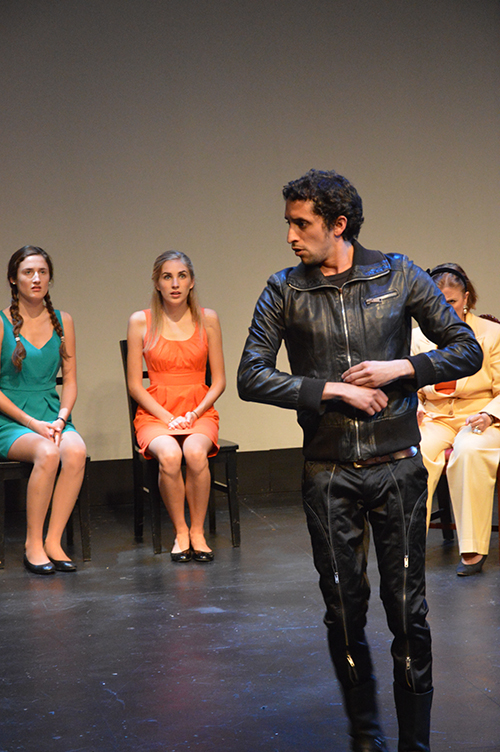Mischief and trickery may be the staples of any Cervantes play, but the amusing antics involved are always grounded by heavier social commentary. Organized by director and novelist Professor Barbara Mujica’s Hispanic Theater class, two of the Spanish playwright’s lesser known one-act plays, El retablo de las maravillas and La cueva de Salamanca, explore this dichotomy between comedy and something a little darker.
The rip-roaring, fast-paced production, loaded with extravagant movements and ladles of charm, had me enraptured throughout. This came as a surprise—I had not expected 17th century Spanish humor to gel with my own, but I found myself responding heartily to the plays’ unexpectedly relatable wisecracks.
Cervantes, a pet favorite of Professor Mujica, is an apt and intelligent choice for this particular endeavor, given his plays’ relative brevity. In fact, the entreméses were originally meant as interludes between longer plays. Their brevity allowed for a spartan set design, which was effective in keeping the overall mood intimate and the drama unfettered by ornamentation. The audience could concentrate fully on the characters themselves, and the only sensory enhancements were the skillful use of light and sound.
I was admittedly relieved at the availability of English subtitles on the background screen. The incongruence of any improvisation made with the subtitles present would have caused some awkwardness, but not once did the neophytes slip up on their lines—a nod to their robust efforts. The screen simultaneously provided a visual backdrop, demonstrating their thoughtful use of multimedia.
The director also did well to modify a 17th century script—with certain elements and archaic terms bound to be lost on us—to suit a contemporary cast and audience. There was a clear attempt to connect to a younger crowd, with modern garb, motorcycles, and even an amusing iPod mention, but the effect was never confusing oranachronistic. Cervantes’s humor and social satire remained dominant throughout.
I could imagine several audience members identifying with his ever-relevant themes of adultery, prejudice and patriarchy. While we should certainly thank Cervantes for his tremendous insight into our core human condition, this feat was achieved in no small part due to the clever dramatic choices to infuse modernity.
Due to the confines of working with limited professional cachet, one may expect noticeable compromises to be made, but the brilliant casting and adept use of resources made these “compromises” seem purposeful. The ostensibly American accents of the non-native speakers somehow worked marvelously with the comic elements—it was hysterical watching the comedy in accordance. The lead, Yoel Castillo (GRAD ‘16), in both plays deserves special mention for his uncanny comic timing and roguish, cheeky swagger. Even the small venue seemed to me a purposeful decision, for the lack of voice projection was less of an issue.
With signature Cervantes style, these plays are works of levity that are filled with fallibly human moments that are the mark of great comedy. The cast and crew manage to bring the playwright’s wit and social commentary to the stage in an inspired, sensitive and modern fashion—no Apple products included.






